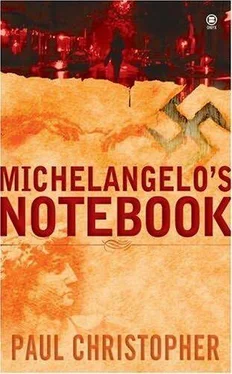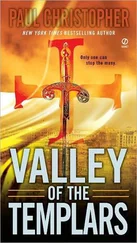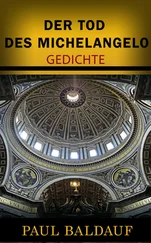Paul Christopher - Michelangelo_s Notebook
Здесь есть возможность читать онлайн «Paul Christopher - Michelangelo_s Notebook» весь текст электронной книги совершенно бесплатно (целиком полную версию без сокращений). В некоторых случаях можно слушать аудио, скачать через торрент в формате fb2 и присутствует краткое содержание. Жанр: Триллер, на английском языке. Описание произведения, (предисловие) а так же отзывы посетителей доступны на портале библиотеки ЛибКат.
- Название:Michelangelo_s Notebook
- Автор:
- Жанр:
- Год:неизвестен
- ISBN:нет данных
- Рейтинг книги:5 / 5. Голосов: 1
-
Избранное:Добавить в избранное
- Отзывы:
-
Ваша оценка:
- 100
- 1
- 2
- 3
- 4
- 5
Michelangelo_s Notebook: краткое содержание, описание и аннотация
Предлагаем к чтению аннотацию, описание, краткое содержание или предисловие (зависит от того, что написал сам автор книги «Michelangelo_s Notebook»). Если вы не нашли необходимую информацию о книге — напишите в комментариях, мы постараемся отыскать её.
Michelangelo_s Notebook — читать онлайн бесплатно полную книгу (весь текст) целиком
Ниже представлен текст книги, разбитый по страницам. Система сохранения места последней прочитанной страницы, позволяет с удобством читать онлайн бесплатно книгу «Michelangelo_s Notebook», без необходимости каждый раз заново искать на чём Вы остановились. Поставьте закладку, и сможете в любой момент перейти на страницу, на которой закончили чтение.
Интервал:
Закладка:
Alfred Andrew Wharton
Lauder J. Cornwall
Admiral Tobias Gatty
Jonas Hale Parker III
Orville Dupont Hale
Jerome C. Crawley
There was no room for coincidence; there couldn’t be. A. A. Wharton was presumably the present headmaster’s grandfather; Lauder Cornwall had to be related to James Cornwall, the late director of the Parker-Hale; Jonas Parker and Orville Hale were descendants of the museum’s founder; Tobias Gatty was obviously connected to the colonel; and Jerome C. Crawley related to Alexander Crawley. No coincidence, but no real connection either. What did six school trustees from the thirties have to do with a pair of present-day homicides and an errant page torn from a notebook half a millennia ago? Mysteries were mysteries but this was verging on the impossible.
Finn glanced up from her notes and looked around the room and its Sherlockian dйcor. She vaguely remembered something from a Sherlock Holmes story she’d read in first year English lit: “When you have eliminated the impossible, whatever remains, however improbable, must be the truth.” So if the venerable detective was anything to go by, there was a connection; she just wasn’t seeing it. The next two hours spent in front of the computer didn’t make anything any clearer though; if anything, her research into the names and their associations only made things more confused.
Using the ISPY search engine, Google, and everything else she could think of, Finn ran not only the first six names but the rest as well, tracing them forward from 1934. Unlike schools such as Phillips Andover in Massachusetts-with alumni including everything from the creator of Tarzan to gay rights activists and assorted recent presidents of the United States-Greyfriars seemed to specialize in people just under the public radar. Of the twelve trustees who took over the school in the 1930s none was truly “A” material. Parker and Hale were only the inheritors of family fortunes and not their creators, like a Cornelius Vanderbilt or a John D. Rockefeller. Gatty was only a rear admiral and the ship eventually named after him was a Liberty cargo vessel, not a battleship or an aircraft carrier. Jerome Crawley, a lawyer, had worked with Bill Donovan, the man who headed up the OSS, precursor to the Central Intelligence Agency. All twelve trustees were like that: senators but not governors or presidents, secretary of the interior but not secretary of state, deputy directors of the CIA but never the head. In fact, when it came to government, the trustees and the sons who followed them were almost invariably non-political appointments: clerks to Supreme Court judges, but never the judges themselves. In business and every other facet of life it was the same-not quite famous, but never scandalized and never dropped. It was almost as though it had been planned that way, and after a while Finn began seeing a vague pattern: the trustees and their progeny weren’t the movers and shakers, they were the bureaucrats and bean counters-the people who held the real power, and held it the longest. A president lasted four years, eight at best; a senator could go on for half a century if he was smart about it, quietly inserting himself or herself onto a dozen or more critical committees. A businessman could collect board memberships like matchbook covers, few people knowing who he was or the clout he wielded. Expediency over ego. Power by proxy. It could easily have been the real motto of the school.
The only other piece of information Finn managed to discover was the fact that all twelve of the trustees had purchased the school under the aegis of something called the Carduss Club. Carduss, she discovered, was the Latin word for “thistle,” possibly in reference to the thistle on the school crest. It was also, obscurely, a pagan sect of Satanists. As far as she could tell, the Carduss Club had ceased to exist in 1945. She found no reference to it after that date. Checking the Web site again she found that everything on it was copyrighted to the Greyfriars Alumni Association LLC-which, she discovered, was actually a numbered trusteeship that had been incorporated in Delaware for some reason.
At that point Finn gave up for good. It was all too confusing. She checked her watch, discovered that most of the day had vanished and gathered up her papers. Maybe it would make more sense to Michael. She smiled at the thought. She thought of him as Michael now. A lover, an assault victim and a fugitive, all in seventy-two hours. She stood, stretched then threaded her way through the gloomy top-floor stacks of Ex Libris and went upstairs to the loft.
She rode up in the elevator, a thousand facts and feelings whirling around in her head. She reached the upper level of the building, waited until the elevator had thumped to a stop then pushed up the gate and opened the rumbling doorway. She stepped out into the brightly lit foyer that opened into the living room, the elevator door shutting automatically behind her. She paused, her heart beginning to thump wildly in her chest, her mind emptying of everything but a single, simple thought: when she’d gone down to the office hours before, the foyer light hadn’t been turned on. Somewhere in the back of the loft she heard the sound of breaking glass.
33
Bobby Izzard smoked a cigarette and poked around in Carl Kressman’s past, meandering through each room in the expensively decorated beach house, opening drawers and looking in cupboards. Maggie and her beefy assistants had zipped Kressman up and taken him away in the big Vandura coroner’s van hours ago. Kenny Frizell was still outside by the pool, fishing for broken bottles with the skimmer net and methodically putting each deadly piece of glass into paper evidence bags, each one with its own little ID tag filled out scrupulously by the young detective. Izzy was alone in the empty house, the last of the light slanting in through the porch screens and the windows, filling the rooms with bars of dusty golden light. They’d done an initial ID by running the guy’s plates. Year-rounder, no snowbird, no record, no violations, no nothing.
Kressman’s house was a classic Gulf Coast “cottage” of the old style, even though it was clearly very new. Covered and screened porches wrapped around the bottom floor, the second floor contained a master bedroom and a guest room and a spiral staircase led from the master bedroom to an eight-by-ten captain’s walk on the peaked roof, fitted like the bell tower of a one-room school-house.
The main floor had a living room and dining room that looked out onto the beach and the Gulf beyond. A kitchen led off from the dining room and behind that was a small bedroom facing the pool. Across the hall from the small bedroom was a large den. The bedroom, the den and the hall all had doors leading out to the pool area.
Even someone who had no idea of the victim’s identity would have picked up on a couple of things as soon as they entered the front door, or maybe even before. The car outside in the garage was a top-of-the-line S-class Mercedes and the furniture inside the house was mostly Edwardian, antique and expensive. Kressman had money. As well as the furniture, all of the art on the walls looked like the real McCoy, canvases thick with paint and framed with lots of gold. Izzy didn’t know art from a horse’s ass but most of it had the same rich feel as the butter-soft leather on the inside of the Benz.
Kressman had been no fool about it either. There was a class-A burglar alarm system and it was connected to the cop shop up on Clubhouse Road, not some empty office in a strip mall and a tape that told everybody the cops had been called in a loud, bullshit voice. At the price the old man had paid for the setup in the cottage there’d have been a cruiser at his front door thirty seconds after anyone so much as breathed too hard on his precious paintings. Not only that, as it turned out the art was all lag-bolted into the wall.
Читать дальшеИнтервал:
Закладка:
Похожие книги на «Michelangelo_s Notebook»
Представляем Вашему вниманию похожие книги на «Michelangelo_s Notebook» списком для выбора. Мы отобрали схожую по названию и смыслу литературу в надежде предоставить читателям больше вариантов отыскать новые, интересные, ещё непрочитанные произведения.
Обсуждение, отзывы о книге «Michelangelo_s Notebook» и просто собственные мнения читателей. Оставьте ваши комментарии, напишите, что Вы думаете о произведении, его смысле или главных героях. Укажите что конкретно понравилось, а что нет, и почему Вы так считаете.











